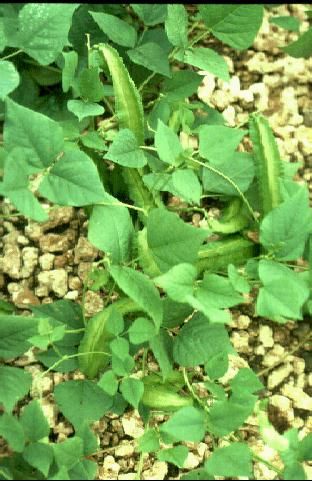Bean, Winged—Psophocarpus tetragonolobus (L.) D.C.1
The winged bean is also known as goa bean and princess bean. The climbing plant is similar in appearance and growth habit to the ordinary garden pole bean. The pointed 3- to 6-inch long leaves are produced on weak vining stems. Some varieties of the plant produce a large tuberous root that is eaten both cooked and raw in Asia. At maturity, the pods are 6 to 9 inches long and 1½ inches broad, with four angled leaflike wings running lengthwise to the pods. Seeds are round and green when mature, similar to soybeans. Root and seed are high in protein. Much publicity has been given this bean because of its high protein content and the edibility of so many parts. Potatoes, yams, and the like have less than 7% protein, while winged bean tubers average 20%. Young pods at the 4- to 6-inch stage are eaten and prepared much as are bush snap beans.

Credit: James M. Stephens
Culture
Winged beans are grown commercially in South Florida to a limited extent. They are found in home gardens where they are grown both as a novelty and as a food crop. Those interested in trying this vegetable should prepare the soil, plant the seed, and care for the plants just as for pole beans. It is a good soil-nitrifying legume.
Since most varieties of winged beans need short days to initiate flowering, yet are frost sensitive, they must be grown during the winter in South Florida while the days are short. Farther north, the shorter days of late fall give best results. Seeds for planting are not easy to find, although some seed catalogs advertise them.


